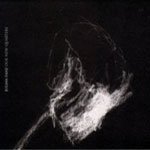Our New Quarters offers some moving moments, but listening to it from start to finish proves rather fatiguing. Julian Fane tries to push the listener toward bleak transcendence on nearly every track, but the redundancy of his tactics results in unconvincing songs in the album’s second half. Taken in isolation from each other, however, I would score most of these tracks as successes. Their cavernous, imposing drum patterns contrast well with quiet hi-hats and Fane’s airy singing. Listening to these well-conceived contrasts is like feeling dry grass crackle underfoot while watching a distant lightning storm (an impression aided by the spindly, haze-on-black album art).
Unfortunately, the charisma in Fane’s production style is soured by his reliance on a fragile, unremarkable falsetto that brings to mind the tepid vocals of indie punching bags like Coldplay and Keane. The songs, choked with political despair, are populated with “peasant bred child marines” and “silence in the trees but for circling flies.” These lugubrious signifiers rub gaunt shoulders with split impulses: Fane’s narrators declare their invincibility and seek/mourn their own immolation. On the beat-heavy tracks, the friction between Fane’s frail voice and the other elements is like a streak of wan light in the dark. But when his voice shifts from serving as a textural component to occupying the core of the mix, as on “Downfall,” it borders on insufferable. Fane sometimes pulls off the wraith-like lament of a certain Radiohead frontman, but too often ends up sounding like a weepy boy.
Fane’s admiration of Radiohead is evident in his songwriting and singing, but he does little to conceal or capitalize upon his crush. (Though I must admit that “New Faces” is pretty cool: it sounds like a smart “Idioteque”/“Pyramid Song” mashup.) Clearly, it would be tough for any artist to beat Yorke & Co. at their own game. Fane certainly doesn’t, but Our New Quarters evinces an instinct for drama and some adroit production in spite of its overall shortcomings.
More about: Julian Fane


